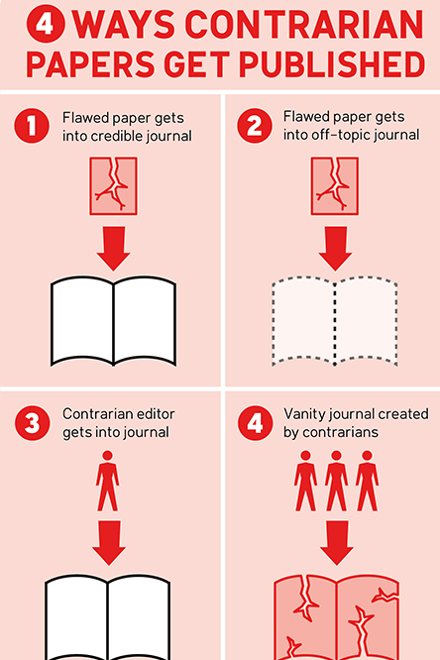 Ways in which contrarians get shoddy science published.
Ways in which contrarians get shoddy science published.Last week, Willie Soon was caught failing to disclose conflicts of interest in his climate research and congressional testimony after having received over $1.2 million in funding from fossil fuel companies. This revelation raised alarms in Congress, with Rep. Grijalva sending letters to the universities of seven other scientists who have provided climate-related testimony, and Senators Markey, Boxer, and Whitehouse sending inquiries to 100 fossil fuel companies, trade groups, and NGOs. Senator Markey wrote,
For years we’ve known that fossil fuel interests have sought to block action on climate change and have denied the science. This investigation will help to determine who is funding these denial-for-hire operations and whether those who are funded by these fossil fuel interests are keeping their funders’ identities secret from the public and legislators
Soon’s funding and failure to disclose conflicts of interest raises red flags, and upon further investigation, the underlying problem is clear. Willie Soon does really bad science, and yet is treated as a climate expert and used by members of Congress to justify opposition to climate policies.
In a paper published last year with our colleagues, John Abraham and I discussed the disproportionate attention that poor-quality climate contrarian papers have received. And as I detailed in my just-published book, climate contrarians like Soon simply aren’t held accountable for their bad science and failed climate predictions. This lack of accountability and disproportionate attention are serious problems.
The reason Soon can be treated as an expert is that he’s been able to publish climate-related research in peer-reviewed journals. To get bad science published in peer-reviewed journals, Soon has followed the same strategies as other climate contrarians with flawed research. He has submitted papers to relatively obscure, non-climate science journals, and he’s exploited “pal review” with friendly journal editors.
 Ways in which contrarians get shoddy science published.
Ways in which contrarians get shoddy science published.
For example, Climate Research editor Chris de Freitas published 14 separate papers from a group of climate contrarians that included Willie Soon during 1997–2003. The practice finally ended in 2003 after the journal published a particularly bad paper by Soon and his colleague Sallie Baliunas.
That paper concluded that current global temperatures are not anomalous compared the past 1,000 years. However, it contained numerous major fundamental flaws, such as equating dryness with hotness, and was subsequently refuted by an article in the American Geophysical Union journal Eos written by a number of prominent climate scientists. The publication of this badly flawed paper, and Climate Research’s refusal to revise or retract it, led to the resignation of five of the journal’s editors. Michael Mann documents the episode in detail in The Hockey Stick and the Climate Wars.
After publishing this paper, Soon was invited by Senator James Inhofe to testify before US Congress, and the Soon and Baliunas paper was used by Congressional Republicans to justify opposition to climate legislation. During that testimony, Soon claimed not to have knowingly received funding from organizations that oppose climate legislation. In reality, he had received such funding. Twelve years later, US Congress still has yet to pass climate legislation.
Make no mistake, Soon and other contrarian scientists are simply used as pawns – excuses for members of Congress to oppose climate legislation. However, most Americans, including a majority of Republicans, support taking action to slow global warming. So why do most Republican policymakers oppose such steps, and how have they been able to oppose the will of a majority of Americans on this issue while recently gaining seats in Congress?
The answer lies with the Merchants of Doubt. As documented in the so-named book and new documentary film, the fossil fuel industry has used the same tactics as the tobacco industry, which successfully prevented Congress from regulating its dangerous and harmful product for many decades.
Merchants of Doubt: What Climate Deniers Learned from Big Tobacco. By Peter Sinclair.
In essence, both industries funded their own scientists, like Willie Soon, who would produce research to cast doubt on the prevailing scientific consensus. Members of Congress then cite this shoddy research to claim the science isn’t settled, and to justify delaying legislative action. Industry-funded scientists like Willie Soon, and science in general, are just pawns in this effort, as Senator James Inhofe made clear with his absurd snowball stunt on the Senate floor last week.
Increasingly, that funding has been channeled through secretive organizations like Donors Trust. As Robert Brulle found in a 2013 study, Donors Trust “now accounts for 25 percent of all traceable foundation funding used by organizations promoting the systematic denial of climate change … In all, 140 foundations funneled $558 million to almost 100 climate denial organizations from 2003 to 2010.” In 2010, Donors Trust and Donors Capital Fund alone channeled nearly $30 million to conservative organizations opposing climate action or science. That accounted for 46% of all their grants to conservative causes.
The oil and gas industry has easily topped the campaign contributions the aforementioned Senator Inhofe has received over the past 25 years, with Koch Industries and Murray Energy being his top contributors. Meanwhile, the Koch brothers’ political network plans to spend $889 million on the 2016 US presidential election.
Willie Soon’s shoddy research and fossil fuel funding are just a symptom of the underlying problem:
Posted by dana1981 on Monday, 2 March, 2015
 |
The Skeptical Science website by Skeptical Science is licensed under a Creative Commons Attribution 3.0 Unported License. |